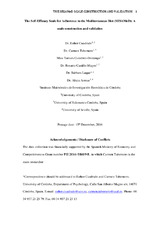Mostrar el registro sencillo del ítem
The Self-Efficacy Scale for Adherence to the Mediterranean Diet (SESAMeD): A scale construction and validation
| dc.contributor.author | Cuadrado, Esther | |
| dc.contributor.author | Gutiérrez Domingo, Tamara | |
| dc.contributor.author | Castillo Mayén, Mª del Rosario | |
| dc.contributor.author | Luque Salas, Bárbara | |
| dc.contributor.author | Arenas, Alicia | |
| dc.contributor.author | Tabernero Urbieta, Carmen | |
| dc.date.accessioned | 2024-02-02T09:06:54Z | |
| dc.date.available | 2024-02-02T09:06:54Z | |
| dc.date.issued | 2018 | |
| dc.identifier.uri | http://hdl.handle.net/10396/26980 | |
| dc.description.abstract | The Mediterranean diet has several beneficial impacts on health. Self-efficacy may be crucial for adhering to the diet. This study set out to develop a reliable and valid instrument that would enable measurement of the extent to which people are confident about their ability to adhere to the Mediterranean diet: the Self-Efficacy Scale for Adherence to the Mediterranean Diet (SESAMeD). The study was carried out in two stages. In Stage 1, a pilot questionnaire was administrated to 170 students to reduce and refine items. In Stage 2, the validity and reliability of the scale were evaluated among a sample of 348 patients who have suffered from cardiovascular disease. After items reduction, the scale consisted of 22 items. The factor structure of SESAMeD was tested across exploratory factorial analysis and confirmatory factorial analysis, with both analyses confirming a robust adjustment for the bi-factorial structure. The two factors identified were (a) self-efficacy for the avoidance of determined unhealthy foods not recommended in the Mediterranean diet and (b) self-efficacy for the consumption of determined healthy foods recommended in this diet. The pattern of relations between the SESAMeD and the SESAMeD subscales and other different psychological variables (outcome expectancies, motivation, affective balance, and life satisfaction) supported the validity of the bi-factorial structure and provided strong evidence of construct validity. The instrument can help health professionals and researchers to assess patients’ confidence of their ability to adhere to the Mediterranean diet, a psychological variable that may affect adherence to this healthy food consumption pattern | es_ES |
| dc.format.mimetype | application/pdf | es_ES |
| dc.language.iso | eng | es_ES |
| dc.publisher | Elsevier | es_ES |
| dc.rights | https://creativecommons.org/licenses/by-nc-nd/4.0/ | es_ES |
| dc.source | Cuadrado, E., Gutiérrez‐Domingo, T., Castillo‐Mayén, R., Luque, B., Arenas, A., & Tabernero, C. (2018). The Self-Efficacy Scale for Adherence to the Mediterranean Diet (SESAMED): A Scale Construction and Validation. Appetite, 120, 6-15. https://doi.org/10.1016/j.appet.2017.08.015 | es_ES |
| dc.subject | Self-efficacy | es_ES |
| dc.subject | Diet adherence | es_ES |
| dc.subject | Mediterranean diet | es_ES |
| dc.subject | Health | es_ES |
| dc.subject | Scale construction and validation | es_ES |
| dc.title | The Self-Efficacy Scale for Adherence to the Mediterranean Diet (SESAMeD): A scale construction and validation | es_ES |
| dc.type | info:eu-repo/semantics/article | es_ES |
| dc.relation.publisherversion | https://doi.org/10.1016/j.appet.2017.08.015 | es_ES |
| dc.relation.projectID | Gobierno de España. PSI 2014–58609-R | es_ES |
| dc.rights.accessRights | info:eu-repo/semantics/openAccess | es_ES |

